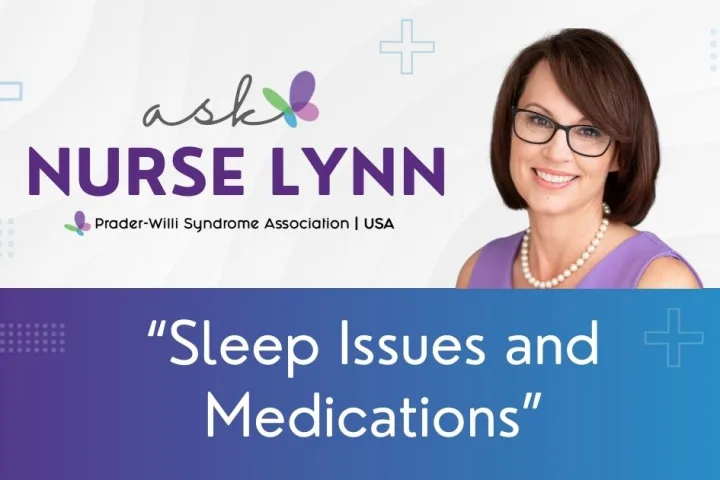Question:
Male, 18 years old, Deletion subtype
My son has low testosterone and is seeing an endocrinologist tomorrow to possibly start increasing this hormone. Is there anything I should look out for? He is at a good weight but has low energy. The primary doctor believes it could be because of the low testosterone. Any thoughts on this would be greatly appreciated.
Nurse Lynn’s Response:
Low testosterone is very common in males with PWS and can cause problems like low energy, tiredness, weak muscles, low bone strength, and sometimes mood changes. Doctors often recommend testosterone treatment, especially for young men who are otherwise at a healthy weight but still feel very tired. Research shows that testosterone may help people with PWS build muscle, lose fat, strengthen their bones, and sometimes improve mood and energy. These benefits are important because people with PWS often have weak muscles and weaker bones as they get older.
There are also some things to watch out for with testosterone treatment. In some people with PWS, it can cause mood swings, irritability, or frustration, though studies show this doesn’t happen often and is usually mild. If he uses skin patches or gels, he may get irritation at the site, and if he picks at his skin, this can be a bigger problem. Injections are another option. Doctors will also want to check his cholesterol, liver, and bone health.
At the endocrinology visit, it’s good to ask what his testosterone levels are now, what kind of treatment the doctor plans to use, and what the main goals are, whether that’s more energy, stronger muscles, healthier bones, or a mix of all three. It’s also important to ask how often he will have checkups and blood work to make sure the treatment is safe. If his low energy is from low testosterone, treatment can really help, but it works best when started slowly and with careful follow-up. Combined with good food choices, exercise, and healthy sleep, testosterone may improve both his health and his quality of life.
Do you have a non-emergency medical question for Nurse Lynn? Submit your question here:
Share this!





 Perry A. Zirkel has written more than 1,500 publications on various aspects of school law, with an emphasis on legal issues in special education. He writes a regular column for NAESP’s Principal magazine and NASP’s Communiqué newsletter, and he did so previously for Phi Delta Kappan and Teaching Exceptional Children.
Perry A. Zirkel has written more than 1,500 publications on various aspects of school law, with an emphasis on legal issues in special education. He writes a regular column for NAESP’s Principal magazine and NASP’s Communiqué newsletter, and he did so previously for Phi Delta Kappan and Teaching Exceptional Children. Jennifer Bolander has been serving as a Special Education Specialist for PWSA (USA) since October of 2015. She is a graduate of John Carroll University and lives in Ohio with her husband Brad and daughters Kate (17), and Sophia (13) who was born with PWS.
Jennifer Bolander has been serving as a Special Education Specialist for PWSA (USA) since October of 2015. She is a graduate of John Carroll University and lives in Ohio with her husband Brad and daughters Kate (17), and Sophia (13) who was born with PWS. Dr. Amy McTighe is the PWS Program Manager and Inpatient Teacher at the Center for Prader-Willi Syndrome at the Children’s Institute of Pittsburgh. She graduated from Duquesne University receiving her Bachelor’s and Master’s degree in Education with a focus on elementary education, special education, and language arts.
Dr. Amy McTighe is the PWS Program Manager and Inpatient Teacher at the Center for Prader-Willi Syndrome at the Children’s Institute of Pittsburgh. She graduated from Duquesne University receiving her Bachelor’s and Master’s degree in Education with a focus on elementary education, special education, and language arts. Evan has worked with the Prader-Willi Syndrome Association (USA) since 2007 primarily as a Crisis Intervention and Family Support Counselor. Evans works with parents and schools to foster strong collaborative relationships and appropriate educational environments for students with PWS.
Evan has worked with the Prader-Willi Syndrome Association (USA) since 2007 primarily as a Crisis Intervention and Family Support Counselor. Evans works with parents and schools to foster strong collaborative relationships and appropriate educational environments for students with PWS. Staci Zimmerman works for Prader-Willi Syndrome Association of Colorado as an Individualized Education Program (IEP) consultant. Staci collaborates with the PWS multi-disciplinary clinic at the Children’s Hospital in Denver supporting families and school districts around the United States with their child’s Individual Educational Plan.
Staci Zimmerman works for Prader-Willi Syndrome Association of Colorado as an Individualized Education Program (IEP) consultant. Staci collaborates with the PWS multi-disciplinary clinic at the Children’s Hospital in Denver supporting families and school districts around the United States with their child’s Individual Educational Plan. Founded in 2001, SDLC is a non-profit legal services organization dedicated to protecting and advancing the legal rights of people with disabilities throughout the South. It partners with the Southern Poverty Law Center, Protection and Advocacy (P&A) programs, Legal Services Corporations (LSC) and disability organizations on major, systemic disability rights issues involving the Individuals with Disabilities Education Act (IDEA), Americans with Disabilities Act (ADA), and the federal Medicaid Act. Recently in November 2014, Jim retired.
Founded in 2001, SDLC is a non-profit legal services organization dedicated to protecting and advancing the legal rights of people with disabilities throughout the South. It partners with the Southern Poverty Law Center, Protection and Advocacy (P&A) programs, Legal Services Corporations (LSC) and disability organizations on major, systemic disability rights issues involving the Individuals with Disabilities Education Act (IDEA), Americans with Disabilities Act (ADA), and the federal Medicaid Act. Recently in November 2014, Jim retired.